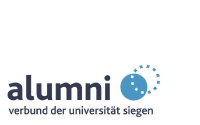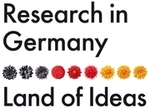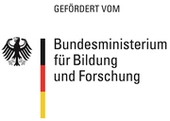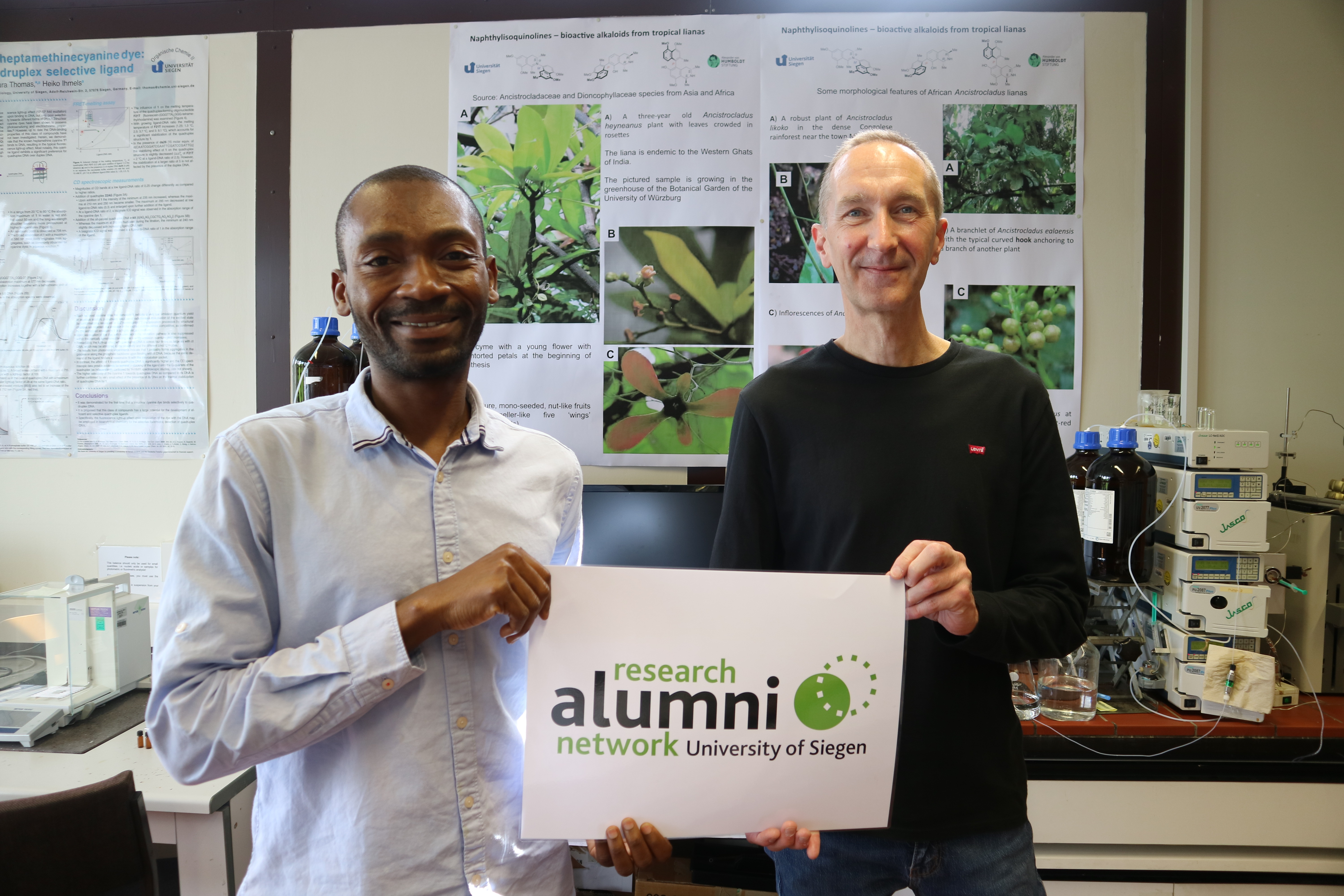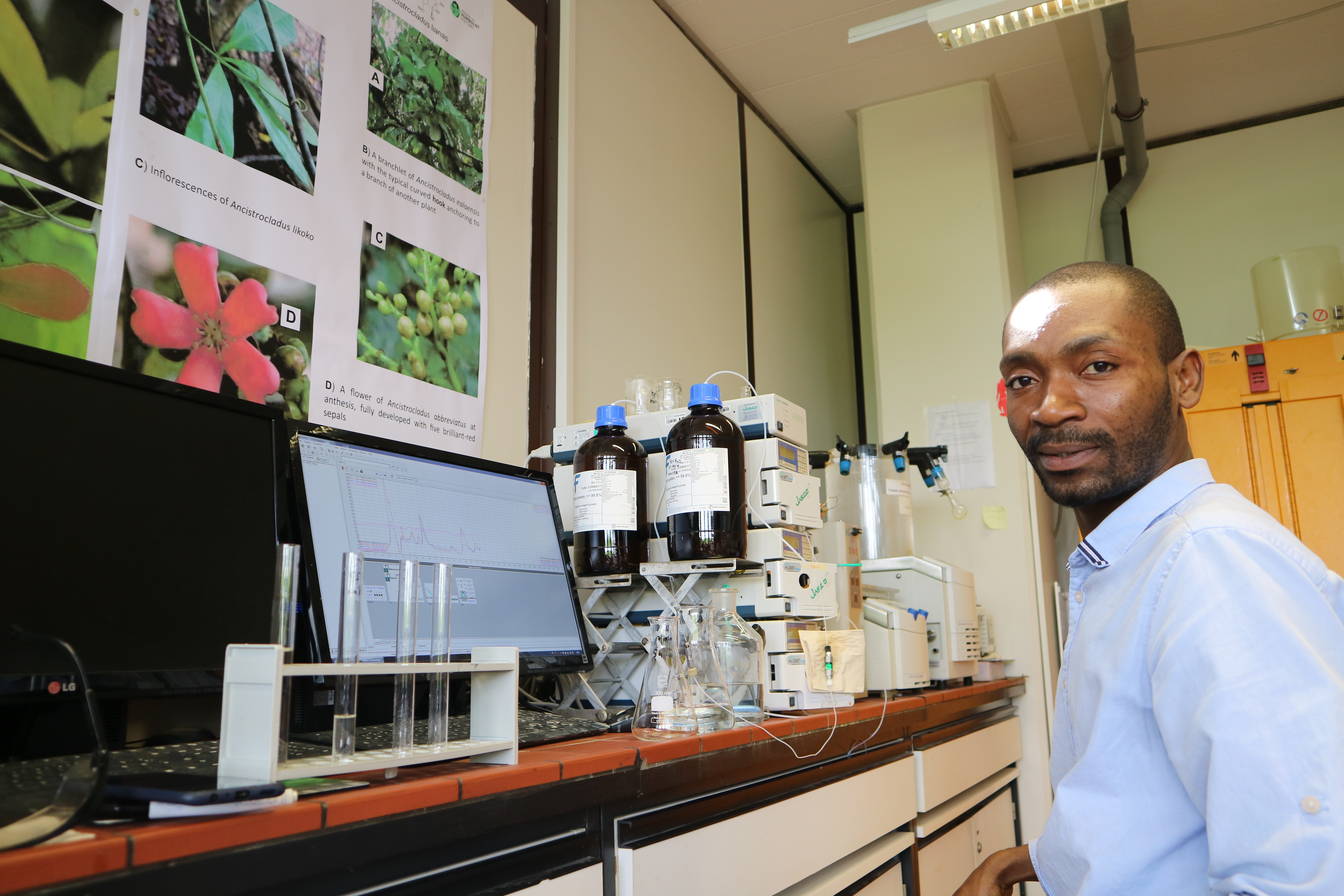- Alexander von Humbold-Stiftung prämiert Konzept zur Vernetzung der Forscher-Alumni
- Forscher-Alumni im "Querschnitt 5/2016"
- Forscher-Alumni im "Querschnitt 4/2017"
- Forscher-Alumni im "Querschnitt 1/2018"
- Forscher-Alumni im "Querschnitt 2/2018"
- Forscher-Alumni im "Querschnitt 3/2018"
- Forscher-Alumni im "Querschnitt 1/2019"
- Forscher-Alumni im "Querschnitt 2/2019"
- Forscher-Alumni im "Querschnitt 3/2019"
- Forscher-Alumni im "Querschnitt 1/2020"
- Forscher-Alumni im "Querschnitt 2/2020"
Dr Nasir Tajuddeen - Prof. Dr Heiko Ihmels
Unveiling the power of nature: Plants as source for bioactive natural products
The guest researcher and postdoctoral fellow of the Alexander von Humboldt-Foundation, Dr Nasir Tajuddeen and his host, Prof. Dr Heiko Ihmels, from the Department of Chemistry and Biology at the University of Siegen are investigating phytochemicals from tropical lianas, in particular naphthylisoquinoline alkaloids. Their research could potentially help in the long term in the fight against parasitic diseases and various cancers.
Dr Nasir Tajuddeen is originally from Ahmadu Bello University in Nigeria and completed his doctorate at the University of KwaZulu-Natal in South Africa. Now as a postdoctoral researcher studying the chemistry of natural products at the University of Siegen, his focus is on a class of compounds found in certain tropical plants. Natural products can be divided into two categories: primary metabolites,-such as carbohydrates and proteins, which are essential for the basic functions of living organisms and secondary metabolites, which serve specialized functions like defense or adaptation. Secondary metabolites, including alkaloids, often help to protect plants from stress, infections, or predators. Humans use these chemical compounds as medicines, dyes and for other applications.
Dr Tajuddeen is particularly interested in a class of compounds called naphthylisoquinoline alkaloids. These natural products are produced by lianas belonging to only two plant families found in Asia and Africa: The Ancistrocladaceae and Dioncophyllaceae. Dr Tajuddeen is not the only one with roots in Nigeria. Some of the plants he is studying also share the same origin. Although none of these compounds have yet been brought to market as a drug, they have the potential to be used against parasitic diseases and even cancers such as pancreatic cancer, leukemia, and multiple myeloma in the future.
Part of Dr Tajuddeen's project is to discover more of these compounds from the plants. Another part is total synthesis,-i.e. the preparation of these natural products in the laboratory, as plants alone cannot be relied upon as a sustainable source of sufficient amounts. This class of compounds and some of their interesting pharmacological activities were already known since they were first discovered in the 1970s.
A significant discovery, however, took place when the US National Cancer Institute was looking for anti-HIV drugs during the HIV pandemic. One of the plants studied showed remarkable activity against the virus, leading to the discovery of a new subclass of these alkaloids, dimeric naphthylisoquinolines, from an equally new Ancistrocladaceae species, Ancistrocladus korupensis, named in honor of the Korup National Park in Cameroon where it was discovered. These compounds were found to be responsible for the anti-HIV activity of the plant extract, inhibiting the replication of the virus.
More recently, naphthylisoquinoline alkaloids have shown promising anticancer activities and another focus of the project is to investigate the anti-cancer properties of these compounds. Preliminary results suggest that they could interact with DNA and interfere the replication of cancer cells. This could lead to healthier and less aggressive treatment options in cancer therapy.
Research Collaboration and Future Directions
In a recently established cooperation with Prof. Bringmann from the University of Würzburg, who is the leading expert on these alkaloids, Prof. Ihmels joined this research field with the main goal to understand how these bioactive compounds function at a molecular level, specifically how they interact with nucleic acids.
Dr Tajuddeen's connection to Professor Bringmann was based on the same interest. He has particular interest in natural products with antimalarial class of compounds with exceptionally good antiplasmodial property, the naphthylisoquinoline alkaloids. The restricted rotation around the biaryl bond of these compounds, confers on them axial chirality and optical activity. Tajuddeen’s ambition to understand this intriguing phenomenon led him to contact Prof. Bringmann, who then recommended Dr Tajuddeen to Prof. Ihmels. This led to the postdoctoral position at the University of Siegen, after a successful application to the Alexander von Humboldt-Foundation for a Georg Forster research fellowship.
Dr Tajuddeen and Prof. Ihmels are pursuing the goal of understanding the molecular mechanisms behind the observed biological activities of naphthisoquinoline alkaloids. The collaboration also includes the exchange of methods and techniques to understand and utilize the biocompatible properties of these natural products better. Research on natural products is important in order to ensure bioadaptability. This is because many compounds can be synthesized, but they may not enter the cell.
For Dr Tajuddeen, the Humboldt Fellowship offers not only financial support, but also valuable networking opportunities. He plans to return to Nigeria and continue his academic career with the continued support of the Humboldt Foundation. The Humboldt Foundation offers its alumni further support, for example through support of follow-up stays at German universities to carry out projects for which the resources are lacking in Nigeria.
Dr Tajuddeen would like to maintain contact with the University of Siegen and its cooperation partners when he returns to Nigeria. The collaboration will continue, especially for structural analyses that require expensive equipment. This will enable him to continue his research in Nigeria and apply the skills and knowledge he has learned. Dr Tajuddeen plans to stay in Siegen for two years. After this time, he will return to Nigeria and continue working in his field of research, supported by the network and resources he has built up during his stay in Germany.
This article is based on an interview conducted and authored by Antonia Blumberg and Duygu Cicek.
